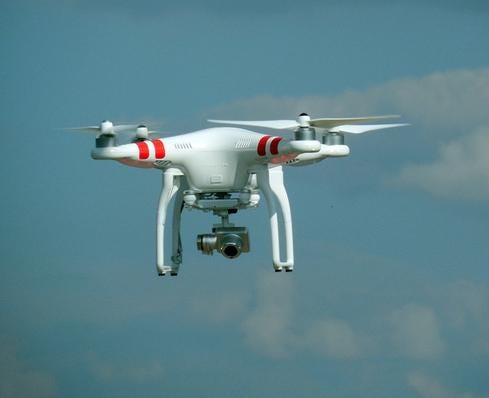Drone Registration Requirement Lands
The Department of Transportation and FAA give a panel one month to develop rules for registering drones in US skies.


Delivery Drone Or Death Machine?
Delivery Drone Or Death Machine? (Click image for larger view and slideshow.)
One month. That's how much time drone owners have to wait before they know exactly what the regulations for registering their quad-, hexa-, octo-, and other-copters will look like. What they know as of Monday, though, is that some sort of registration is coming.
That was the gist of an announcement made Monday by US Transportation Secretary Anthony Foxx and FAA Administrator Michael Huerta. The two officials said that they have formed a task force to develop recommendations for drone registration, and that the task force is scheduled to make those recommendations on Nov. 20, 2015. In government terms, that's lightning speed.
According to a press release on the Department of Transportation's website, the task force will be made up of members from 20 to 30 stakeholder groups representing interests from radio-controller aircraft hobbyists to professional airline pilots. The task force is supposed to recommend procedures and processes that will be effective while imposing a low workload penalty on owners. In addition, the task force will recommend a cut-off line, below which drones would not have to be registered, as well as ways to streamline the process for registering commercial drones.
The push to do something to regulate drones and their operators comes on the heels of a number of incidents in which drones came close to commercial aircraft in flight, flew over and into the stands at sporting events, and landed on the lawns of the White House and US Capitol. While regulations regarding commercial drone use have labored through the FAA's systems, the sheer number of hobbyist drones in consumer hands -- and the anticipation that the upcoming holiday season will bring millions more drones onto the market -- have made a rapid solution to these smaller drones a high priority.
[ Read about Google filing FAA paperwork detailing its drone plans. ]
Other government agencies have, in the past, had licensing requirements for consumer-grade devices. One of the more notable was the FCC's requirement of operator licenses for GMRS (General Mobile Radio Service) handheld radios. In this case, those who bought these "walkie-talkies," which often shared frequencies with the unlicensed FRS (Family Radio Service) frequencies, were required to complete a postcard form and register for a five-year license at a cost of $90. The licensing was simple and straightforward, with no requirement to show any operating skill or technical knowledge. The licensing ultimately failed, though, due to most radio purchasers ignoring the requirement.

(Image: fill via Pixabay)
The greatest questions regarding the pending drone registration recommendations are not so much what they will be, but how they will be enforced and how many buyers will abide by the terms. It's likely that hobbyists and drone manufacturers will resist a system that requires registration before the drone is transferred to the buyer. A system that depends on the purchaser to register after the sale is liable to suffer mass non-conformance.
In any case, the Department of Transportation is eager to have a system in place before the coming holiday season. Now, we get to watch the upcoming series of leaks and press releases to get a sense of how merry the holidays will be for drone vendors.
About the Author(s)
You May Also Like






